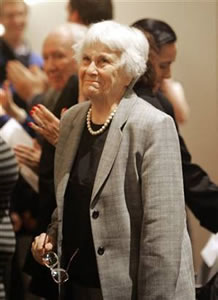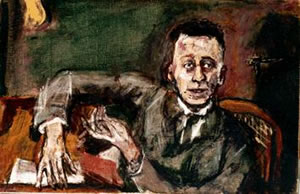De Engelse dichter en vertaler Charles Cotton werd geboren op 28 april 1630 in Beresford in Staffordshire. Zie ook alle tags voor Charles Cotton op dit blog.
The Morning Quatrains (Fragment)
Now doors and windows are unbarr’d,
Each-where are cheerful voices heard,
And round about ‘Good-morrows’ fly,
As if Day taught Humanity.
The chimnies now to smoke begin,
And the old wife sits down to spin,
Whilst Kate, taking her pail, does trip
Mull’s swoll’n and straddl’ing paps to strip.
Vulcan now makes his anvil ring,
Dick whistles loud, and Maud doth sing,
And Silvio with his bugle horn
Winds an Imprime unto the Morn.
Now through the morning doors behold
Phoebus array’d in burning gold,
Lashing his fiery steeds, displays
His warm and all-enlight’ning rays.
Now each one to his work prepares,
All that have hands are labourers,
And manufactures of each trade
By op’ning shops are open laid.
Hob yokes his oxen to the team,
The angler goes unto the stream,
The woodman to the purlews hies,
And lab’ring bees to load their thighs.
Fair Amarillis drives her flocks,
All night safe-folded from the fox,
To flow’ry downs, where Colin stays,
To court her with his roundelays.

Charles Cotton (28 april 1630 – 16 februari 1687)
Charles Cotton’s vissershuisje (gebouwd in 1674) aan de oevers van de rivier de Dove. Cotton woonde in het nabijgelegen Beresford Hall
De Meso-Amerikaanse dichter en filosoof Nezahualcóyotl werd geboren in Texcoco op 28 april 1402. Zie ook alle tags voor Nezahualcóyotl op dit blog.
He Makes The Eagles And Ocelots Dance With Him! (Fragment)
Thus the dead one was directed,
when he died:
‘Awaken, already the sky is rosy,
already dawn has come,
already sing the flame-coloured guans,
the fire-coloured swallows,
already the butterflies fly.’
Thus the old ones said
that who has died has become a god,
they said: ‘He has been made a god there,
meaning ‘He has died.’
Even jade is shattered,
Even gold is crushed,
Even quetzal plume are torn . . .
One does not live forever on this earth:
We endure only for an instant!
Will flowers be carried to the Kingdom of Death:
Is it true that we are going, we are going?
Where are we going, ay, where are we going?
Will we be dead there or will we live yet?
Does one exist again?
Nezahualcóyotl (28 april 1402 – 4 juni 1472)
Standbeeld in Ciudad Nezahualcóyotl (Neza)
De Franse dichter Auguste Barbier werd geboren op 28 april 1805 in Parijs.Zie ook alle tags voor Auguste Barbier op dit blog.
Matrimonium – Satire (Fragment)
Cher lecteur! Suis mes pas, entrons dans un ménage
Où, sous la cheminée, on bâcle un mariage;
Prenons place au foyer et voyons un instant
Ce qu’ on pense tout haut sur ce point important.
La maison est bourgeoise ou noble, peu importe:
Aujourd’ hui qu’ on n’ a plus d’ écussons à sa porte,
Que la fortune a mis son niveau sur les rangs,
Le langage et les moeurs ne sont point différents.
-Mon ami, dit la femme au père de famille,
Il est temps de songer à pourvoir notre fille.
Le Père.
Eh bien, soit. Tu connais Acaste, il a du bien,
Trois frères sans enfants, un nom qui vaut le mien;
Il ne prendra que peu… c’ est vraiment notre affaire.
La Mère.
Mais il est, cher ami, presque sexagénaire.
Le Père.
Tant mieux, c’ est un motif pour qu’ il ne soit pas fou
Et ne croque son bien jusques au dernier sou.
La Mère.
Monsieur Georges, ami, me plairait davantage;
Il a trente ans au plus, barbe noire au visage;
C’ est un joli valseur et des plus complaisants
À promener au bal les ennuis des mamans.
Il pourrait devenir receveur ou notaire.

Auguste Barbier (28 april 1805 – 14 februari 1882)
Cover
De Duitse schrijver Bruno Apitz werd geboren in Leipzig op 29 april 1900. Zie ook alle tags voor Bruno Apitz op dit blog.
Uit: Bruno Apitz. Eine politische Biographie (door Lars Förster)
„Bruno Apitz erblickte um die Jahrhundertwende das Licht der Welt: am 28. April 1900. Sein nachfolgender Lebensweg, insbesondere seine Kindheit und Jugend. ist untrennbar mit Leipzig verbunden. Die Stadt war damals eine der größten mitteldeutschen Industriestädte und das Zentrum der sich institutionalisierenden Arbeiterbewegung. Hier bildete sich ein dichtes Netz an Organisationen und Arbeitervereinen. dessen Mittelpunkt die SPD war. Die Leipziger SPD genoss zu dieser Zeit den Ruf außerordentlicher Radikalität sowie marxistischer Revolutionsgläubigkeit und entwickelte sich zur Hochburg linker Strömungen innerhalb der deutschen Sozialdemokratie. Hier gab später Franz Mehring die damals auch weit über Sachsens Grenzen hinaus bekannte sozialdemokratische »Leipziger Volkszeitung« heraus, das wichtigste Sprachrohr des linken SPD-Flügels. Apitz wuchs anfangs im Osten Leipzigs auf, im Arbeitervorort Volkmarsdorf. heute wie damals ein Problemviertel. Sein Geburtshaus befand sich in der Elisabethstraße 15, direkt gegenüber der Lukaskirche. dem Zentrum dieses Vororts. Bruno war der ungewollte Nachzügler einer Arbeiterfamilie. Seine Mutter. Marie Friederike Apitz. geborene Anhalt, hatte bereits elf Kinder geboren, von denen nur fünf am Leben geblieben waren. Die anderen hatten nicht einmal ihre Windelzeit überlebt. »Kindersegen. bedeutete in vielen Arbeiterfamilien vor allem »Kinderlast.. Jedes Neugeborene war ein Esser mehr am Tisch, was die Nöte und die ohnehin schon starke Arbeitsbelastung der Mütter vergrößerte. Bruno Apitz wuchs somit gemeinsam mit fünf Geschwistern in nach heutigen Maßstäben zerrütteten Familienverhältnissen auf. Seine Mutter. Jahrgang 1863, stammte aus ländlich-proletarischen Verhältnissen, sie hielt sich mühsam mit Wäschewaschen über Wasser. Ungewöhnlich für diese Zeit ist wohl. dass Apitz’ Mutter allen politischen Fragen mit großer Aufgeschlossenheit begegnete. Sie war Freidenkerin und hatte schon in jungen Jahren Zusammenstöße mit der Kirche erfahren. die einmal sogar zu einem Prozess wegen Gotteslästerung geführt hatten. Damals war sie bereits Mitglied der SPD und besuchte abends innerhalb der Leipziger Arbeiterbildungsvereine die Frauenzirkel von Clara Zetkin und Käte Dunelter, um sich ein gewisses Maß an Bildung anzueignen. Apitz’ Mutter kann wohl als Urbild einer selbstbewussten. sächsischen Proletarierin am Anfang des 20. Jahrhunderts gelten, die man heute als emanzipiert bezeichnen würde. Der Vater. Friedrich Hermann Apitz – von der Familie nur der »Alte« genannt – war als Wachstuchdrucker zwar sehr arbeitsam, pflegte jedoch auch eine Kehrseite als grober Kerl und Alkoholiker. Einen Großteil seines Verdienstes vertrank er. Die Mutter und die sechs überlebenden Geschwister hatten unsäglich unter ihm zu leiden. »Nicht. daß er die Mutter geprügelt hätte.. erinnerte sich Apilz später…“aber er gröhllte und randalierte. daß die Nachbarn zusammenliefen.«

Bruno Apitz (28 april 1900 – 7 april 1979)
Cover
Onafhankelijk van geboortedata
De Amerikaanse dichteres Kathryn Maris werd geboren in New York in 1971. Zij woont sinds 1999 in Londen. Zij behaalde een BA in Engelse literatuur aan de Columbia University en een MA in creatief schrijven Boston University. Maris publiceerde o.a. de bundel “God Loves You” (2013) en “The Book of Jobs” (2006). Ze heeft een Pushcart Prize gewonnen, een Academy of American Poets Award en beurzen van Yaddo, het Fine Arts Work Centre in Provincetown en van Hawthornden Castle. Haar gedichten zijn verschenen in Poetry Review, Plowshares, Poetry London, Slate, Poetry, The Spectator en The Financial Times, evenals in vele bloemlezingen, waaronder Best British Poetry 2012, Dark Matter: Poems of Space en de Oxford Poets Anthology. Ze geeft online en face-to-face lessen voor de Poetry School.
School Run
I board the same bus I boarded this morning
and see the same driver from the earlier journey.
Our eyes meet; he remembers me too.
When I exit, I feel abandoned by the driver
I know from many early-morning journeys
to my daughter’s school in northwest London.
Why do I feel the driver has abandoned me?
Has an imagined intimacy developed?
At my daughter’s school in northwest London
were the usual mums and dads I greet
with an imagined sense of intimacy
that has nothing to do with friendship.
Among the many mums and dads I greeted
with politeness, or something like fondness
having nothing at all to do with friendship,
were business people and psychoanalysts.
Out of politeness or something like fondness,
I do not ask the driver why he left me.
He’s not in the business of psychoanalysis;
it’s not his job to say I miss my daughter,
that it was a loss when my daughter left
my body, when I met her eyes after the birth.
It’s not his place to say I’m losing my daughter.
I exit the same bus I boarded this morning.

Kathryn Maris (New York, 1971)
De Britse schrijver Zia Haider Rahman werd in 1969 geboren op het platteland van Bangladesh in de regio Sylhet. Zie ook alle tags voor Zia Haider Rahman op dit blog.
Uit: In the Light of What We Know
“The greatest difference between us, however, the significance of which I did not begin to ascertain until two years after our first meeting, lay in our social classes. As I mentioned, my father was an academic at Oxford, and my mother, after seeing off her only child to university, had returned to practising as a psychotherapist, throwing herself into the retraining necessary to make up ground lost while raising me. My maternal grandfather had been Pakistan’s ambassador to the United States and had moved in that country’s elite internationalist circles; his closest friend had been Muhammad Asad, Pakistani ambassador to the UN shortly after 1947, a man who had begun life as Leopold Weiss, an Austro-Hungarian Jew born in what is now Ukraine. On the paternal side, my grandfather was an industrialist whose fortune, based on landholdings and tenancies, he augmented with the profits of shipping enterprises.
More than once during term time, Zafar came with me to lunch at my parents’ home, a large double-fronted, three-storey Victorian house like many in that part of Oxford, though somewhat more capacious than the homes of most academics. To this day, whenever I return there, I feel an ease and lightness suffuse my being as I tread across the sweeping arc of the driveway, the gravel crunching underfoot, up to the stained glass of the wide front door.
On his first visit, Zafar stood at the threshold, wiping his feet over and over, his eyes darting about the large hall, his mouth slightly open. Evidently, he was, as people often are, astonished by the books, which were everywhere: shelves hanging wherever a wall would allow, books overflowing onto the floors, even leaning accordion-like on the staircase along the wall. In the family room, old issues of science magazines and journals, my father’s subscriptions, sat in box files on shelves that scored the walls like lines on a writing pad. More recent issues lay about in small piles on a sideboard and on the floor. Zafar surveyed all this but his eyes settled on the far wall that was covered with my father’s collection of old maps, mounted and framed, of the Indian subcontinent under the British Raj, an area that today stretches from Pakistan across India to Bangladesh.”

Zia Haider Rahman (Sylhet, 1969)
De Duitse theoloog, filosoof, mysticus, schrijver en dichter Johannes Eckhart werd omstreeks 1260 in Hochheim geboren. Zie ook alle tags voor meister Eckhart op dit blog.
Götterdämmerung (Fragment)
Von kühnen Wunderbildern
Ein großer Trümmerhauf,
In reizendem Verwildern
Ein blühnder Garten drauf;
Versunknes Reich zu Füßen,
Vom Himmel fern und nah,
Aus anderm Reich ein Grüßen –
Das ist Italia!
Wenn Frühlingslüfte wehen
Hold übern grünen Plan,
Ein leises Auferstehen
Hebt in den Tälern an.
Da will sichs unten rühren
Im stillen Göttergrab,
Der Mensch kanns schauernd spüren
Tief in die Brust hinab.
Verwirrend in den Bäumen
Gehn Stimmen hin und her,
Ein sehnsuchtsvolles Träumen
Weht übers blaue Meer.
Und unterm duftgen Schleier,
Sooft der Lenz erwacht,
Webt in geheimer Feier
Die alte Zaubermacht.

Meister Eckhart (Rond 1260 – 1328)
























